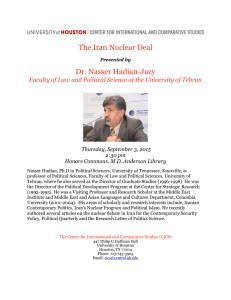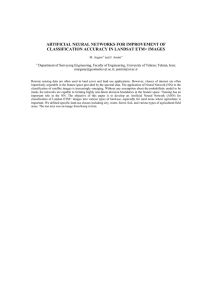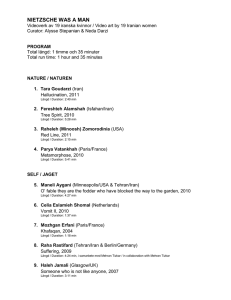Mohammad Ghasemi Damavandi
advertisement
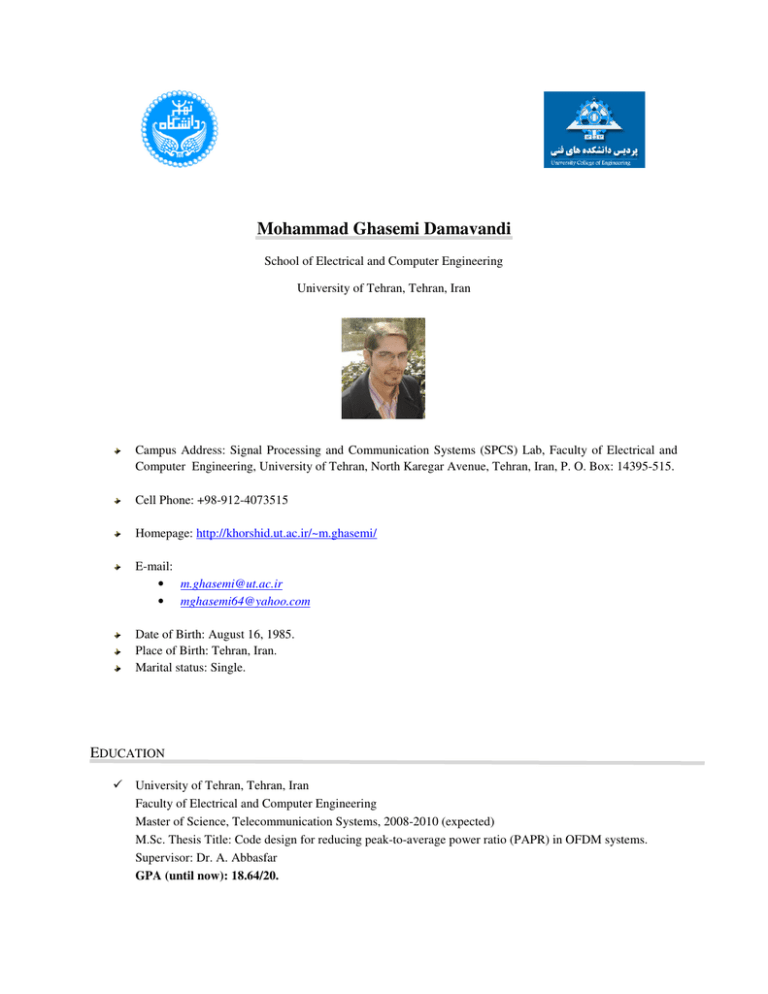
Mohammad Ghasemi Damavandi School of Electrical and Computer Engineering University of Tehran, Tehran, Iran Campus Address: Signal Processing and Communication Systems (SPCS) Lab, Faculty of Electrical and Computer Engineering, University of Tehran, North Karegar Avenue, Tehran, Iran, P. O. Box: 14395-515. Cell Phone: +98-912-4073515 Homepage: http://khorshid.ut.ac.ir/~m.ghasemi/ E-mail: • m.ghasemi@ut.ac.ir • mghasemi64@yahoo.com Date of Birth: August 16, 1985. Place of Birth: Tehran, Iran. Marital status: Single. EDUCATION University of Tehran, Tehran, Iran Faculty of Electrical and Computer Engineering Master of Science, Telecommunication Systems, 2008-2010 (expected) M.Sc. Thesis Title: Code design for reducing peak-to-average power ratio (PAPR) in OFDM systems. Supervisor: Dr. A. Abbasfar GPA (until now): 18.64/20. University of Tehran, Tehran, Iran Faculty of Electrical and Computer Engineering Bachelor of Science, Electrical Engineering (Telecommunications), 2003-2008 B.Sc. Thesis Title: Analysis and suppression of phase-noise in OFDM systems. Supervisor: Dr. S. Nader-Esfahani GPA: 16.46/20. GPA of last two years (Fall 2006-Spring 2008): 18.05/20. GPA of telecommunication specialized courses (33 credits): 18.15/20. Sobhan High School, Tehran, Iran Pre-university Program GPA: 19.06/20. Daneshmand High School, Tehran, Iran Diploma in Mathematics and Physics Overall GPA: 19.63/20. RESEARCH INTERESTS Wireless Communications/Networks o Cooperative networks o Ad-hoc and sensor networks o Cognitive radio o MIMO systems o Cross layer design/Wireless network protocols Information/Coding Theory o Information theory of wireless networks o Source/Channel coding Multiple access channel Detection and Estimation Theory Signal Processing HONORS Ranked first or second place among all “Telecommunication Systems” students in M.Sc. program in the University of Tehran (until now) Ranked 63th among 12000 participants in the nationwide university entrance exam for Master of Science, Electrical Engineering (Telecommunications), 2008. Ranked 172th among 350000 participants in the nationwide university entrance exam for Bachelor of Science, 2003. • Selected as “Exceptional Talents” by “National Organization for Educational Testing” Selected as “Excellent in Term” in the last two years of the BSc program, Spring 2008, Fall 2007, Spring 2007, Fall 2006. Ranked first place at high school and pre-university program among all students. Won acceptance in the first stage of “Persian Literature” Olympiad, 2001. PUBLICATIONS M. Ghasemi Damavandi and A. Abbasfar, “Upper bounds on achievable PMEPR through subcarrier sign selection,” accepted to be presented in VTC2011-Spring conference, Jan. 2011. M. Ghasemi Damavandi and A. Abbasfar, “On codes with good peak-to-mean envelope power ratio,” Submitted to IEEE Commun. Letters, Feb. 2011. M. Ghasemi Damavandi and A. Abbasfar, “An asymptotically full rate coding scheme with good PMEPR behavior,” to be submitted. LANGUAGE SKILLS Native in Farsi, Fluent in English, Familiar with Arabic. Internet Based TOEFL score: 105/120 Reading: 29/30 Listening: 24/30 Speaking: 23/30 Writing: 29/30 Graduate Record Examinations (GRE) Verbal Reasoning: 400 (35% below) Quantitative Reasoning: 780 (89% below) Analytical Writing: 3.5 (26% below) RESEARCH EXPERIENCES AND SOME SELECTED ACADEMICS PROJECTS Fall 2010, Research, study and simulation on “Wideband spectrum sensing for cognitive radio.” Fall 2009, Research and simulation about “Multiple-Input Multiple-Output (MIMO) and Adaptive Modulation and Coding (AMC) Techniques in Mobile WiMAX,” final project of “Fundamentals of Wireless Communications,” Dr. A. Abbasfar, Signal Processing and Communication Systems (SPCS) Lab. Fall 2009, Simulation of an adaptive beam-forming antenna using the LMS algorithm, course project of “Fundamentals of Wireless Communications,” Dr. A. Abbasfar, SPCS Lab. Fall 2009, Study, simulation and presentation on “Coding for peak-to-average-power ratio reduction in OFDM systems,” Seminar of Communication Systems, Dr. M. Kamarei and Dr. A. Abbasfar, SPCS Lab. Fall 2009, Discrete signal processing, Discrete-time filter design, Delay estimation in Radar systems, Speech compression using DCT and Tone recognition, all using MATLAB, course projects of “Discrete Signal Processing (DSP),” Dr. GH. Hossein-Zadeh, SPCS Lab. Spring and summer 2009, Research on “Dirty paper coding with noisy information of interference at encoder: study and modification using Kalman Filter,” final project of “Information Theory,” Dr. F. Lahouti, Wireless Multimedia Communications (WMC) Lab. Implementation of Kalman Filter. Spring and summer 2009, Research and study about “Direction of arrival (DOA) at antenna arrays in coherent and non-coherent scenarios,” final project of “Detection and Estimation Theory,” Dr. A. Olfat. Spring and summer 2009, Research on “Blind Multiuser (CDMA) detection in multipath fading channels without channel estimation,” final project of “Spread Spectrum and Multiuser Detection,” Dr. A. Olfat. Spring 2009, MATLAB implementation of DS/CDMA multiuser detectors: Matched Filter, Optimal Detector (Viterbi), MMSE Detector and Decorrelator, course projects of “Spread Spectrum and Multiuser Detection,” Dr. A. Olfat. Fall 2008, Research on “Quasi-cyclic LDPC codes and their application to distributed source coding,” final project of “Coding Theory,” Dr. F. Lahouti, WMC Lab. Implementation of Message-Passing LDPC decoder for Slepian-Wolf source coded signals. Fall 2008, Design and simulation of encoder and decoder of well-known channel codes: block codes, cyclic codes and convolutional codes (Viterbi decoder), course projects of “Coding Theory,” Dr. F. Lahouti. Fall 2008, Simulation of sequence detection using Viterbi decoder, course project of “Advanced theory of communication,” Dr. A. Olfat. Spring 2008, Implementation of TCP over UDP using Java, final project of “Computer Networks.” Spring 2008, Implementation of Raw Socket Ping Server using C++, course project of “Computer Networks.” Spring 2008, Implementation of a simple Torrent Network using Java, course project of “Computer Networks.” Spring 2008, Implementation of some computer networks using OPNET: Token Ring, Ethernet, Switched LANs, ATM, course project of “Computer Networks.” Spring 2008, Implementation of some routing protocols using OPNET: RIP and OSPF, course project of “Computer Networks.” Spring 2008, Design of a Low Noise Amplifier (LNA) using ADS, course project of “Communication Circuits.” Spring 2008, Design of a Power Amplifier using ADS, course project of “Communication Circuits.” Spring 2008, Design of a Driscoll Oscillator using ADS, course project of “Communication Circuits.” Spring 2008, Design of a single stub matching using HFSS/ADS and implementation and testing using Network Analyzer, final project of “Microwave Lab.” Spring 2008, Study and presentation on SONET systems, course project of “Digital Transmission Systems.” Spring 2008, Analysis and design of an E-plane waveguide filter using MATLAB and HFSS, final project of “Microwave I.” Spring 2007, Design of a wideband CMOS Telescopic Folded Cascode Operational Trans-conductance amplifier (OTA) using HSPICE, course project of “Electronics III.” Spring 2007, Design and simulation of a Sample & Hold circuit constructed of a CMOS Telescopic Cascode OTA using HSPICE, course project of “Electronics III.” Spring 2007, Design of a wideband CMOS two-stage OTA using H-SPICE, course project of “Electronics III.” Spring 2007, Design of a high-gain CMOS compensated differential two-stage OTA using HSPICE, course project of “Electronics III.” Spring 2007, Construction and testing of a 16x4bit Stack (data-path and controllers) using Quartus, Verilog and Altera development board, project of “Digital Logic Circuits Lab.” Spring 2007, Design of a Serial Arithmetic Machine using Quartus/Verilog soft-wares, course project of “Digital Logic Circuits” TEACHING EXPERIENCES Spring 2010, “Signals and Systems,” Teaching Assistant, School of ECE, Faculty of Electrical and Computer Engineering, University of Tehran. Spring 2010 and spring 2009, “Telecommunication II (Digital Communications),” Teaching Assistant, School of ECE, Faculty of Electrical and Computer Engineering, University of Tehran. Fall 2009, “Telecommunication I (Analogue Communications),” Teaching Assistant, School of ECE, Faculty of Electrical and Computer Engineering, University of Tehran. Fall 2009, “Wireless Multimedia Communications,” Teaching Assistant, School of ECE, Faculty of Electrical and Computer Engineering, University of Tehran. Fall 2008, “Engineering Mathematics,” Teaching Assistant, School of ECE, Faculty of Electrical and Computer Engineering, University of Tehran. Fall 2008, “Communication Circuits,” Teaching Assistant, School of ECE, Faculty of Electrical and Computer Engineering, University of Tehran. 2003-2004, “Supplementary Mathematics,” Teacher, Sobhan High School. WORK EXPERIENCES Summer 2008, Feasibility study and primary design of a tool for detecting holes and defects in oil tanks based on Magnetic Flux Leakage (MFL), Industrial Training (internship), Antenna Lab, Dr. R. Faraji-Dana, funded by Iranian Offshore Oil Company. Spring 2010, Testing the MFL tool in detecting holes and defects in oil tanks, Lavan Island, Iran. GRADUATE COURSES Discrete-time Signal Processing (DSP), Fall 2009, Dr. G. Hossein-Zadeh, marked 19.2/20. Fundamentals of Wireless Communications, Fall 2009, Dr. A. Abbasfar, marked 17.8/20. Seminar of Communications, Fall 2009, Dr. M. Kamarei, marked 19.75/20. Information Theory, Spring 2009, Dr. F. Lahouti, marked 19.5/20. Detection and Estimation Theory, Spring 2009, Dr. A. Olfat, marked 18.3/20. Spread Spectrum and Multiuser Detection, Spring 2009, Dr. A. Olfat, marked 18/20. Stochastic Processes, Fall 2008, Dr. S. Nader-Esfahani, marked 19.6/20. Channel Coding Theory, Fall 2008, Dr. F. Lahouti, marked 19/20. Advanced Theory of Communications, Fall 2008, Dr. A. Olfat, marked 17/20. SELECTED UNDERGRADUATE COURSES Some Courses Marked A+ (above 19/20) B. Sc. Thesis, Telecommunication II (Digital Communications), Microcomputer Principles, Synthesis & Design of Filter, Communication Circuits, Antennas I and its Lab, Electronics II, Electrical Circuits I, Power System Analysis II, Internship. Some Courses Marked A (between 17/20 and 19/20) Computer Networks, Telecommunication I, Fields and Waves, Electrical Circuits II, Electrical Measurement, High-voltage & Insulation and its Lab, English Language, Specialized English Language COMPUTER SKILLS MATLAB Operating Systems and Microsoft Office Microsoft Windows 98/2000/XP/Vista/7, PowerPoint, Word, Excel, Visio. Programming Languages M-file programming, C/C++, Java. Simulation Software MATLAB/Simulink, HSPICE, PSPICE, Quartus, Modelsim, Verilog, OPNET, HFSS, ADS. Others LaTeX. EXTRACURRICULAR ACTIVITIES AND INTERESTS Sport Ping Pong Soccer Literature
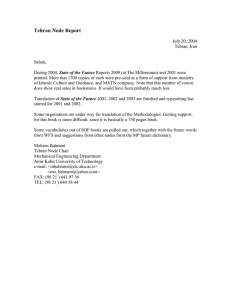
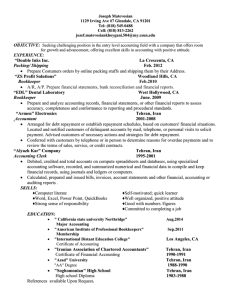
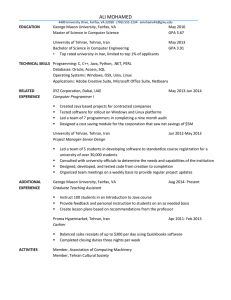

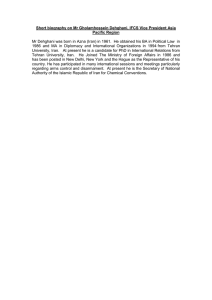
![Amir Shams [ card ] 02](http://s2.studylib.net/store/data/005340099_1-e713f7ae67edd60d4c53ae5bb9448166-300x300.png)
